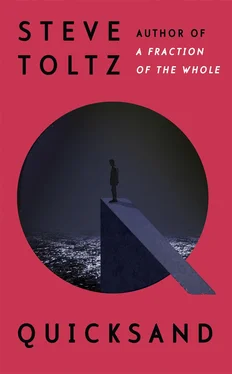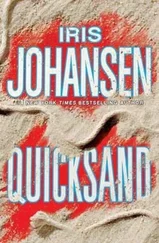My character witnesses, Mimi and Stella and Liam and Morrell, took the stand and all said more or less the same thing, that I was kind and gentle and nonviolent, always helping people with their problems and offering insightful advice. To tell you the truth, I thought I sounded insufferable. The last witness was Gretel (Saffron) who told how I was sweet and tender and had fast become one of her favourite clients. I was grateful, but the obliterating gaze of juror number seven during her testimony — as if he couldn’t believe he’d schlepped all the way over for this —put me in a black mood. Interestingly, I felt the jury hardened their hearts every time I winced in pain, my spasms all damning witnesses for the prosecution. If ever there was a trial in which the entire jury wanted to rise in unison and break into a run, this would be it.
When it was my turn to testify, I had to position myself beside the witness stand; there was no ramp. I considered making a point of the lack of wheelchair access, but I didn’t think it would do me any good.
— Did you think that Jin looked unhappy? asked the prosecutor.
— Everybody looks unhappy to me.
— Did she look frightened?
— Yes, I admitted, but I thought she was frightened of me, and I discounted that fear because I did not consider myself frightening; in fact, no one in my entire life has ever feared incurring my wrath, in particular my sexual wrath, although, OK, like any man, from time to time I’ve stared at a woman on the street so brazenly she would cross her arms to obscure her cleavage or sling her arm around her boyfriend to send me a clear message, but that’s par for the course, and in this case, Jin’s fears were unfounded, and in addition I remember thinking how enjoyable was the prospect of watching her fear dissipate when she clocked my gentle, tender and generous nature.
— Did you think she looked sad?
— Yes, I did, but I thought her sadness was for me, because I’m an irredeemably pathetic figure, not because she was a slave, a fact of which I was entirely ignorant.
The judge asked if I had anything further to add.
This was my moment. I looked over the courtroom at the pop-eyed, incensed and vaguely inquisitive faces of friends and enemies and began by calling for a minute’s silence for my victim — who can refuse a minute’s silence in our society? — but that was just to buy myself time, being distracted as I was by the jarring realisation that this scene had a striking resemblance to one of my actual nightmares, although even my subconscious hadn’t the temerity to go so far as to render me paralysed at a rape trial.
I began by saying how in the crystal-clear hierarchy of the child/adult universe, anyone from the age of zero to about fourteen feels vulnerable to indiscriminate and unjust punishment, but once you’ve been an adult a decade or two, you no longer feel the ‘type’ to get punished, in the same way as the chronically healthy don’t feel the ‘type’ to get multiple sclerosis — murder raps and degenerative diseases fit exactly nobody’s self-image, and anyway, the fact that I was on trial was bizarre when one took into consideration the fact that it’d been thirty years since I intentionally broke the law: I photocopied money. I was twelve years old and it was before the ready availability of coloured toner — I used crayons.
The jurors looked none too impressed by my opening remarks. I continued.
As to the particulars of this case, I explained, I felt conflicted. On the one hand the charge was absurd. And on the other hand it was perfectly reasonable. A young or middle-aged woman should have the right, not to sell her body, but to lease it on an hourly basis if she finds the rate acceptable, yet I believed it was clearly the brothel owner’s responsibility to ensure the legality of these women. Who was I, border protection? What was I supposed to do, ask for her passport?
The jurors’ deliberations were happening in real time on their indignant faces, as, I note, yours are also, ladies and gentlemen. Yet as now I must continue, so I did then.
I said that they, the jury, might be against prostitution in principle but under the law of our land prostitution in Australia in the early twenty-first century was legal and it was therefore not reasonable to expect a customer paying for lawful services to single-handedly regulate an industry or to do the job that a competent monitoring body should be doing. Where prostitution is legal, the burden should not be on the client, in the same way that when you purchase a car or flat-screen television — I regretted the analogy right at the beginning of the sentence — one has to trust the shopkeeper’s honesty. If you don’t like this idea, then criminalise prostitution, for it is simply unreasonable for the consumer to have to make that kind of split-second assessment. I was essentially arguing for a legislative change, rather than the specifics of my own case. A brothel client is, at worst, a predator who pays good money for his prey’s time, and who often falls inappropriately in love with his prey, I said, adding that of course I did not set out to break the law that did not in fact exist thirty days earlier, then I segued to the real reason that it was me specifically on the stand and not one of many thousands of other brothel-frequenting men across the country. Because bad luck is my pathology, I explained. Nothing ever fell into my lap other than cups of boiling tea. Me, who contracted septicaemia from a nipple ring, hepatitis B from a tattooist’s needle, who thrice yearly bites down on tinfoil embedded in kebabs and reconstituted melted blocks of chocolate, who has never ducked under a barbed-wire fence without getting snagged or had a haircut that the hairdresser hasn’t had to personally apologise for. Not to mention who was unjustly accused of rape at seventeen while still a virgin, and is now on trial for raping a woman who, at the time, I was naïvely proud to have penetrated. All my life I’ve felt, I went on to say, as if I were in a boxing ring with my hands taped to my sides. Every punch is a free punch for my opponents. Raising or lowering my guard seems to make no sort of difference to my fortunes. The human I most relate to is Tsutomu Yamaguchi, I said, the poor sucker who was in Hiroshima on business when the atomic bomb fell and who returned to Nagasaki just in time for the second …
I couldn’t finish the thought. I had drifted off. Then it was all over, and over quickly. I heard the dreaded verdict: guilty. The judge’s voice like a stalled train jolting to life. I was sentenced to two years. I scanned the faces of the jury for an embarrassed smile.
— Aldo, in your top pocket! Mimi called out. In the pocket she had placed, that morning, two pills in case of the worst news. I took them immediately, thinking they were cyanide.
— Valium! she said.
— One day you will come out with a great grey Merlin of a beard and amazing abs, Stella called out.
— Or else in a box with shoelace marks still visible on your throat where they cut you down, Liam added.
— A miscarriage of poetic justice! Morrell shouted.
Stella raced over and wrapped her arms around me. I was taken away after that, wheeled out of the courtroom through a door to my other worst nightmare: prison.
You expect the brutality to start right away but they’re careful not to violate your rights all at once. The bailiff led me gently into the back of a windowless, wheelchair-accessible van with five other prisoners: two armed-robbers; a granny murderer; a taxi driver who’d raped six of his passengers over a long weekend and had been sentenced, in his words, to ‘four years with no vaginal scent’; and another man who’d been convicted of raping his wife, and who, the taxi driver said, ‘was so pussy-whipped, he couldn’t even rape outside of marriage’. This was already unbearable.
Читать дальше











